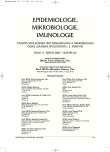-
Medical journals
- Career
Clinically Important β-Lactamases of Gram-Negative Bacteria: Extended-Spectrum β-Lactamases (ESBL)
Authors: J. Hrabák
Authors‘ workplace: Ústav mikrobiologie LF UK a FN v Plzni
Published in: Epidemiol. Mikrobiol. Imunol. 56, 2007, č. 3, s. 103-111
Overview
β-lactamases are the commonest cause of a resistance of gram-negative bacteria to β-lactam antimicrobial agents. The introduction of the third - and fourth - generation cephalosporins into clinical practise is the reason of an evolution of new β-lactamases being able to hydrolyze these antibiotics. Extended-spectrum β-lactamases (ESBLs) are the major group of these enzymes. Most of the ESBLs are mainly structural mutants of penicillinases TEM-1, TEM-2 and SHV-1. For several reasons, ESBL-producing isolates should, by definition, be reported as resistant to all penicillins, cephalosporins and monolactams. Due to seriously reduced antibiotic choice for infections caused by ESBL-producing bacteria, ESBLs pose a serious clinical problem. This review will focus on the characterization and identification of ESBLs, interpretation of sensitivity testing results of ESBL producing bacteria and an appropriate treatment of infections caused by ESBL-producers.
Key words:
resistance – cephalosporins – β-lactamases – enterobacteria – ESBL.
Labels
Hygiene and epidemiology Medical virology Clinical microbiology
Article was published inEpidemiology, Microbiology, Immunology

2007 Issue 3-
All articles in this issue
- Clinically Important β-Lactamases of Gram-Negative Bacteria: Extended-Spectrum β-Lactamases (ESBL)
- Prion Diseases
- Immunogenicity of Vaccines Against Viral Hepatitis A and B in the Population above 40 Years of Age – Impact of Risk Factors
- ABC Transporter Proteins in Multidrug Resistance of Microorganisms
- Results of Surveillance of Human Leptospirosis
- Epidemiology, Microbiology, Immunology
- Journal archive
- Current issue
- Online only
- About the journal
Most read in this issue- Clinically Important β-Lactamases of Gram-Negative Bacteria: Extended-Spectrum β-Lactamases (ESBL)
- Prion Diseases
- Immunogenicity of Vaccines Against Viral Hepatitis A and B in the Population above 40 Years of Age – Impact of Risk Factors
- ABC Transporter Proteins in Multidrug Resistance of Microorganisms
Login#ADS_BOTTOM_SCRIPTS#Forgotten passwordEnter the email address that you registered with. We will send you instructions on how to set a new password.
- Career

